11 Dec2020
By Ward Cummings
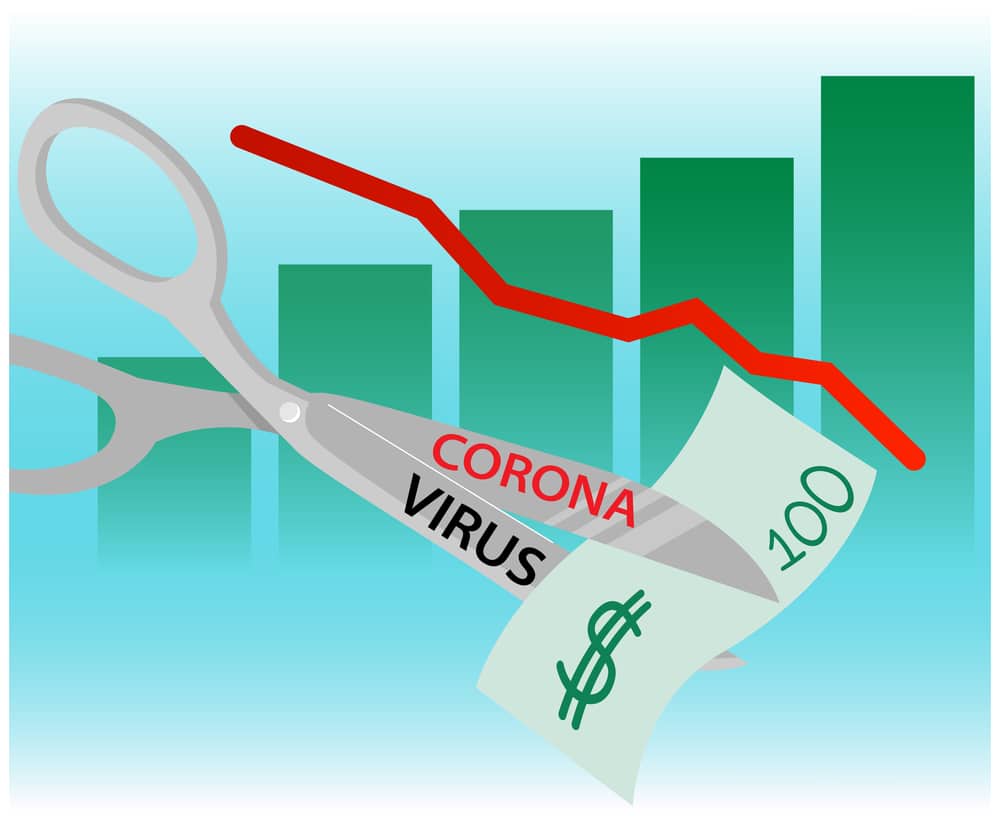 This month, AACTE joined like-minded institutions in writing a letter to congressional leaders in updating their earlier findings regarding four key COVID-19-related economic indicators that are placing significant financial burdens on higher educational institutions. The emergence of more detailed data regarding these four categories (enrollment, student financial need, auxiliary revenues, and new expenditures) revealed the troubling truth that our prior estimates about the impact of COVID-19 on the economic health of educational institutions was significantly underestimated and that the challenges students and schools are facing are far more severe than initially thought.
This month, AACTE joined like-minded institutions in writing a letter to congressional leaders in updating their earlier findings regarding four key COVID-19-related economic indicators that are placing significant financial burdens on higher educational institutions. The emergence of more detailed data regarding these four categories (enrollment, student financial need, auxiliary revenues, and new expenditures) revealed the troubling truth that our prior estimates about the impact of COVID-19 on the economic health of educational institutions was significantly underestimated and that the challenges students and schools are facing are far more severe than initially thought.
As a consequence of these updated findings, AACTE signed on to a new letter urging Congress and the Administration to finalize negotiations as quickly as possible on a supplemental spending bill of sufficient size to provide at least $120 billion in needed support to students and campuses across the country. The detailed new findings described in the letter, while suggesting a potentially long, painful economic road ahead for some higher ed, provides a detailed and illuminating accounting of the many ways COVID-19 is burdening enrollment, student aid, and revenues at institutions of higher learning around the country.
09 Dec2020
By Weade James

Current participants of the AACTE Holmes Program are encouraged to submit an application to serve on the 2021-22 Holmes Council. The Holmes Council is comprised of Holmes students who serve in a leadership capacity to support AACTE with implementation of the Holmes Program, specifically in areas of scholar engagement and retention.
The Call for Nominations will open December 18 and end January 15, 2021. The following officer positions are vacant for nominations:
- President
- Vice President
- Secretary
- Historian
- Sergeant at Arms
- Research Coordinator
- Social Media Coordinator
- Master’s Representative
- General Alternate I
- General Alternate II
Interested scholars are encouraged to learn more about these positions prior to completing the nomination process. Self-nominations are accepted and encouraged. Scholars may also be nominated by their program coordinators, peers or other individuals.
Following the nominations, Holmes institutions will be invited to elect officers to serve on the 2021-22 Holmes Council. The voting window will occur starting January 28 through February 12, 2021. Elected officers will be announced during the Holmes Program event at the 73rd AACTE Annual Meeting on February 23, 2021.
For more information about the AACTE Holmes Program, please contact me at wjames@aacte.org.
09 Dec2020
By Ward Cummings
Congratulations to the newly elected ACSR officers Anne Tapp of Michigan, Christine Gorowara of Delaware, and Keith Lambert of Washington.
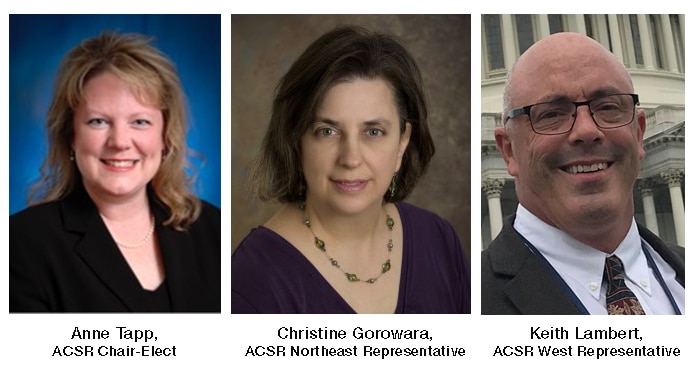
Anne Tapp, ACSR chair-elect, is a professor and program director at Saginaw Valley State University. She is a former president of Michigan state chapter of AACTE and currently serves as ACSR Midwest Region representative. Christine Gorowara, ACSR Northeast Region representative, is the senior associate director of the Delaware Center for Teacher Education at the University of Delaware and currently serves as president of the Delaware state chapter of AACTE. Keith Lambert, ACSR West Region representative is an associate professor at Whitworth University and the current president of the Washington state chapter of AACTE. Each new office holder will begin serving their term in February, at the close of the AACTE 2021 Annual Meeting.
08 Dec2020
By Nicole Dunn
A growing body of research suggests that concerns about compensation generally—and about being able to repay student loans in particular—are dissuading college students from choosing teaching as a career. To help AACTE members better understand the financial pressures impacting education students, a new issue brief takes a detailed look at how students pursuing a bachelor’s degree in education pay for college, including the costs they face and the financial sources they tap to meet those expenses.
During AACTE’s webinar “How Do Students Pay for College,” author Jacqueline King and Jane West discussed the implications of these findings, as well as recommendations for campus practice and federal policy.
King began the webinar by explaining, “Student financing of education feels archaic and arcane … can be kind of intimidating.” To help those who were unable to join this webinar, outlined below are specific parts of the online discussion that may address some of your most pressing concerns around financing teacher candidate education. Access the recording at aacte.org.
08 Dec2020
By Nicole Dunn
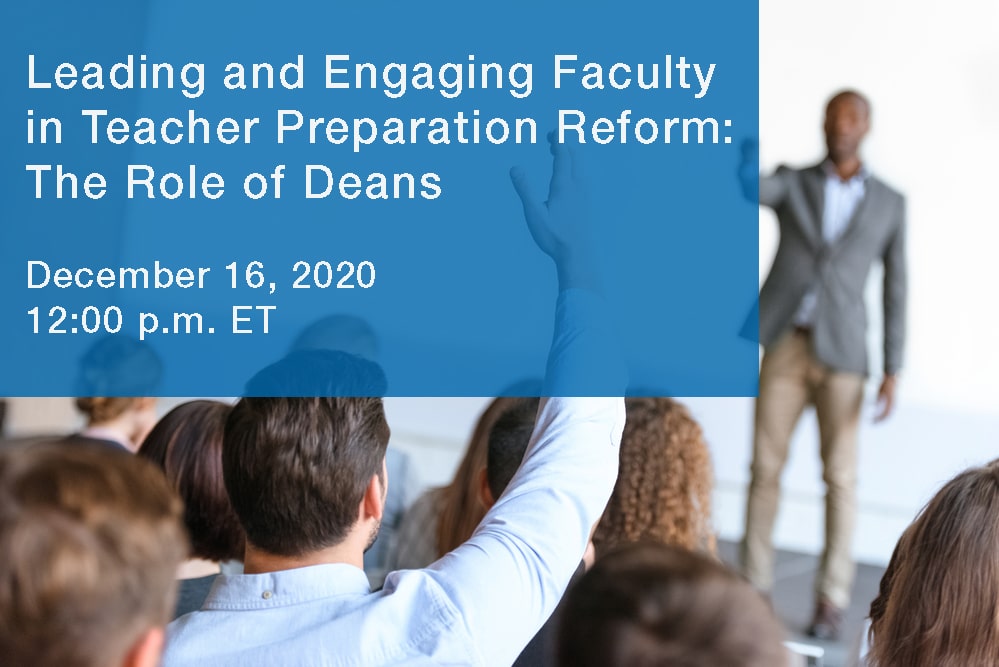
AACTE and CEEDAR (Collaboration for Effective Educator Development, Accountability, and Reform) Center are partnering together to present a webinar centered on a special issue brief, Leading and Engaging Faculty in Teacher Preparation Reform: The Role of Deans. The issue brief summarizes the experiences in leadership of six current and former deans who have been identified as engaging in successful collaborative reform efforts within their colleges.
During the one-hour event, Mary Brownwell will talk with Marquita Grenot-Scheyer and Kandi Hill-Clarke about the issue brief and their experiences of cultivating collaboration and supporting innovation among general and special education faculty who share responsibility to support students in diverse and inclusive classrooms. Since few resources exist to support deans in their efforts to work with faculty to engage in this work, AACTE and CEEDAR believe the experiences of these leaders will be useful to other deans as they work toward similar outcomes.
Register for the webinar, which will take place December 16 from 12:00 – 1:00 p.m. (ET). Learn more about the panelists:
08 Dec2020
By Jacqueline Rodriguez, Jane E. West, Jacqueline E. King, Ph.D. and Ward Cummings
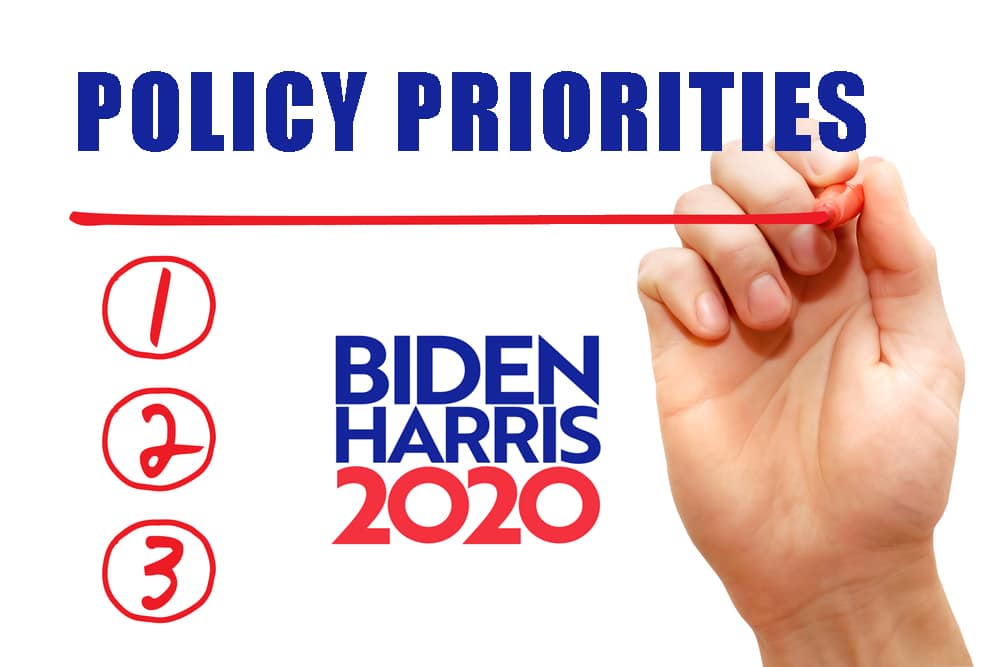 The nation’s transition to the 46th presidential administration are underway. AACTE provided the Biden-Harris Administration’s Education Transition Team with its policy priorities for the coming year. Much of AACTE’s priorities stem from its advocacy throughout the year to increase the federal investment in education in PK-20, with a specific focus on recruiting and sustaining candidates in its education preparation programs.
The nation’s transition to the 46th presidential administration are underway. AACTE provided the Biden-Harris Administration’s Education Transition Team with its policy priorities for the coming year. Much of AACTE’s priorities stem from its advocacy throughout the year to increase the federal investment in education in PK-20, with a specific focus on recruiting and sustaining candidates in its education preparation programs.
As a result of the COVID-19 pandemic, educator preparation stands at a dangerous crossroad. The college and university programs that prepare our teachers, principals, school counselors, and other essential education professionals are experiencing a debilitating wave of closures and faculty layoffs.
08 Dec2020
By Katrina Norfleet
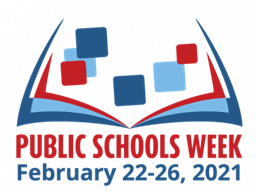 AACTE is joining its partner Learning First Alliance in celebrating Public Schools Week, February 22-26, 2021, to bring attention to the great accomplishments and great needs of public education. While schools are a place for nurture and learning, the global pandemic has created massive challenges for public schools. Still, public schools across the country have kept 50.7 million schoolchildren, 3.2 million teachers, and many other school staff and parents safe.
AACTE is joining its partner Learning First Alliance in celebrating Public Schools Week, February 22-26, 2021, to bring attention to the great accomplishments and great needs of public education. While schools are a place for nurture and learning, the global pandemic has created massive challenges for public schools. Still, public schools across the country have kept 50.7 million schoolchildren, 3.2 million teachers, and many other school staff and parents safe.
According to Learning First Alliance, public schools are emphasizing new goals this year:
- Keep children healthy by creating new educational practices, including cleaning, maintaining social distance, and screening those who need to be treated;
- Feed millions of students outside of school;
- Expand internet connectivity of students;
- Teach more effectively online by adapting existing curriculums; and,
- Increase awareness of racial justice and mental health and seek ways to connect to students who are grieving or traumatized.
08 Dec2020
By JTE Insider
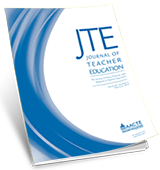 Check out a recent JTE Insider podcast by the Journal of Teacher Education (JTE) editorial team. This blog is available to the public, and AACTE members have free access to the articles in the JTE online archives—just log in with your AACTE profile.
Check out a recent JTE Insider podcast by the Journal of Teacher Education (JTE) editorial team. This blog is available to the public, and AACTE members have free access to the articles in the JTE online archives—just log in with your AACTE profile.
This podcast interview features insights from the article, “Preparing Teachers to Notice Race in Classrooms: Contextualizing the Competencies of Preservice Teachers With Antiracist Inclinations,” by Niral Shah and Justin A. Coles. The article is published in the November/December 2020 issue of the Journal of Teacher Education.
Article Abstract: Race-focused teacher education has centered on changing preservice teachers’ racial beliefs and attitudes. In this article, we build on this work by exploring how preservice teachers identify and address issues of race and racism in the everyday work of teaching and learning. To conceptualize these processes, we propose the theoretical framework of “racial noticing,” which extends the literature on teacher noticing to the consideration of racial phenomena. Using a comparative case study design, this study focuses on three elementary preservice teachers (two identifying as White, one identifying as Black) with antiracist inclinations. Findings show that they demonstrated generally strong competencies with racial noticing during a mathematics methods course, but that contextual factors influenced shifts in racial noticing during student teaching. We argue that race-focused teacher education centered on noticing the impact of race and racism in learning settings can make the practice of antiracist teaching more tractable for preservice teachers.
Listen Now.
08 Dec2020
By Katrina Norfleet
In partnership with Learning First Alliance, AACTE supports a letter sent to the Center for Disease Control (CDC) committee on vaccine priorities requesting that school personnel are a priority group once the administration of a COVID-19 vaccine begins. Below is a reprint from our partner organization, AASA: The School Superintendent Association, outlining the request.
LFA Board to CDC Committee on Vaccine Priorities
As part of our work with the Learning First Alliance, this week, AASA sent a letter to the Center for Disease Control (CDC) committee on vaccine priorities requesting that school personnel – including teachers, specialized instructional support personnel, aides, food service and custodial workers, and principals – are a priority group once the administration of a COVID-19 vaccine begins. Specifically, the letter highlights the profound impact of the COVID-19 pandemic on the economy and indicates that prioritizing school personnel for the initial distribution is critical for building public trust and reaching the vaccine target immunity goal.
The American Association of Colleges for Teacher Education, American Federation of Teachers, American School Counselor Association, Consortium for School Networking, Learning Forward, National Association of Elementary School Principals, National Association of Secondary School Principals, National Education Association, National PTA, National School Boards Association, and National School Public Relations Association joined AASA in this effort. If you want to check out the full letter, then click here!
04 Dec2020
By Jerrica Thurman
Get inspired at the AACTE
73rd Annual Meeting Speaker Spotlight and Closing Sessions, featuring award-winning activist Bettina Love on February 25 and renowned presidential historian Michael Beschloss on February 26.
 Bettina L. Love
Bettina L. Love
Speaker Spotlight Session Presenter
Thursday, February 25, 2021 | 5:00-6:00 p.m. ET
Dr. Bettina L. Love is an award-winning author and the Athletic Association Endowed Professor at the University of Georgia. She is one of the field’s most esteemed educational researchers. Her writing, research, teaching, and activism meet at the intersection of race, education, abolition, and Black joy. Dr. Love is concerned with how educators working with parents and communities can build communal, civically engaged schools rooted in Abolitionist Teaching with the goal of intersectional social justice for equitable classrooms that love and affirm Black and Brown children. In 2020, Dr. Love co-founded the Abolitionist Teaching Network (ATN). ATN’s mission is simple: develop and support teachers and parents to fight injustice within their schools and communities. In 2020, Dr. Love was also named a member of the Old 4th Ward Economic Security Task Force with the Atlanta City Council.
 Michael Beschloss
Michael Beschloss
Closing Keynote Speaker
Friday, February 26, 2021 | 1:30-2:30 p.m. ET
Michael Beschloss is an award-winning presidential historian, scholar of leadership and bestselling author of ten books, most recently the acclaimed New York Times and Wall Street Journal bestseller Presidents of War. The New York Times Book Review calls Presidents of War “a superb and important book, superbly rendered.” The Financial Times says that the book “looks at leadership from every angle” and calls it “epic” and “magisterial.” The historian Ron Chernow calls the book “monumental and profoundly important.” Tom Hanks says, “Once again, Beschloss captures our Presidents in terms both historic and human.”
04 Dec2020
By Jacob Easley II
This article originally appeared in Diverse Issues in Higher Education and is reprinted with permission.
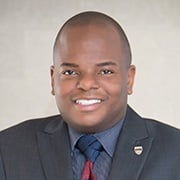 The 1787 U.S. Constitution was ratified to establish justice, liberty, and prosperity, but not for all Americans. Like the Constitution, early American educational practices were based on a system of whiteness and elitism. Justice and prosperity for those who comprise marginalized groups have remained largely unfulfilled. We know for certain that we are a pluralistic society. No one group has singularly built this nation, secured its borders, nor defended its values. The plurality of our nation is our strength. As educators, particularly who prepare America’s future teachers, we must double down, now more than ever, on what Horace Mann said, “Education, beyond all other devices of human origin, is the great equalizer of the conditions of men, the balance wheel of the social machinery.”
The 1787 U.S. Constitution was ratified to establish justice, liberty, and prosperity, but not for all Americans. Like the Constitution, early American educational practices were based on a system of whiteness and elitism. Justice and prosperity for those who comprise marginalized groups have remained largely unfulfilled. We know for certain that we are a pluralistic society. No one group has singularly built this nation, secured its borders, nor defended its values. The plurality of our nation is our strength. As educators, particularly who prepare America’s future teachers, we must double down, now more than ever, on what Horace Mann said, “Education, beyond all other devices of human origin, is the great equalizer of the conditions of men, the balance wheel of the social machinery.”
America has yet to become an equal society, and these societal ills create the need for scholar activism embedded in Critical Race Theory (CRT), which historically documents and names the atrocities carried out in this country in the name of freedom, liberty, and democracy. America’s struggle to uphold the Constitution for all its citizens makes it necessary to examine the structural oppression that encumbers the United State from fully living up to its democratic ideals. Through CRT, scholars across higher education have researched racial inequality that emerged from the social, economic, and legal differences created between races to maintain elite, white interests in this country. If our national laws and practices are to ensure justice and equity, then educators have a great deal of work to do in ensuring the American ideals we teach youth to value in school are a reality for all.
04 Dec2020
By Marni Kay
In 2017, several Elementary Education faculty members came together to create the University of Central Florida (UCF) Lake County Teacher Knights program, which was designed to support students who were graduating from the UCF South Lake Campus as they navigated their first few years in the classroom. Each month, the faculty members host evening professional learning sessions (with dinner) for these first through third year teachers. Additionally, they have partnered with Lake County Schools professional development department to host workshops on topics of the teachers’ request.
Now in year four, Lake County Teacher Knights are reflecting on a question many senior interns and recent graduates ask themself before that first day in their senior placement or their first classroom … “What do I need to know?” Well, here is what this group of dedicated and talented teachers want to share with future senior interns and new career teachers, shared with love and hope for a brighter teaching future.
Here is their A-Z list of everything you wished you knew …
04 Dec2020
By Jane E. West

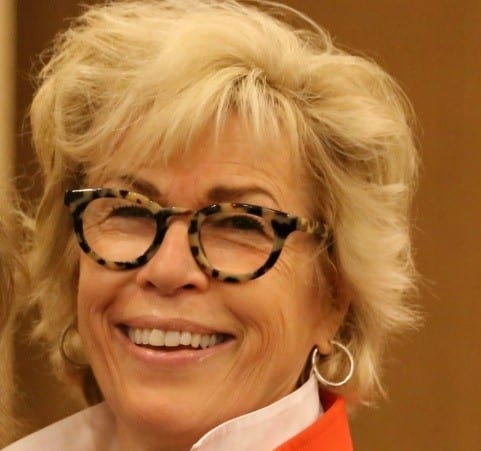 This article originally appeared on the Department of Education website and is reprinted with permission.
This article originally appeared on the Department of Education website and is reprinted with permission.
I began my journey as a special educator in 1973. My first job was as a paraprofessional for students with emotional disturbance. The program was intended to transition students who had been in psychiatric hospitals back into public school. Our classroom was housed in a trailer on the playground of an elementary school in the Bronx.
Fresh out of college with a degree in literature, I was very keen on poetry. With the support of the teacher in charge of my class, I developed a curriculum on poetry. Much to my delight, the students were all in. They wrote some magnificent poems. Shortly after we finished the unit, the principal announced a school wide poetry contest. Elated, I met with him and provided the students’ work for submission to the contest. After looking at the poems briefly, he returned them to me saying, “There is no way those students could have written those poems.” I was devastated.
04 Dec2020
By Audrey Hill
The University of Maryland, Prince George’s Community College and Prince George’s County Public Schools announced a dual enrollment program to increase the teaching workforce in the state.
The Middle College Program enables high schoolers from county schools to earn an associate of arts degree in teaching while completing their high school requirements. Dual enrollment students can then transfer seamlessly into the UMD College of Education’s undergraduate teaching program; the program also aligns with Bowie State University and Howard University’s academic requirements.
“The collaboration is a reflection of our commitment to developing innovative new pathways to prepare an excellent and diverse teacher workforce for Prince George’s County Public Schools and for the state of Maryland,” said Jennifer King Rice, dean of the College of Education. “This model of ‘growing your own’ teachers will increase diversity in the education field, develop teachers from the local community and address critical teaching shortages.”
01 Dec2020
By Katrina Norfleet

In a recent interview with AACTE, Gaëtane Jean-Marie, dean and professor of educational leadership at the College of Education, Rowan University, discusses the importance of preparing teacher candidates to understand the cultural background of students in moving toward a more humanistic approach to see the learner as an individual.
Why is it important to prepare teacher candidates in culturally responsive classroom management?
It is to really realize the belief that all children can learn. A while back when I was teaching as a faculty member, I remember DuFour’s comment that stayed and resonates with me; it is that, “if we truly believe that all children can learn, what then do we do when they can’t, when they are not learning?” It makes me ask: What is our responsibility to help bridge the cultural gap between teachers and students? As we continue to help diversify the teaching profession, it is still predominantly white teachers who are the educators, so how do we prepare them? What’s the responsibility of ensuring that our teacher candidates can really meet the needs of all learners? Given the demographic shift, where more of our Black and Brown children are in schools and will be taught by teachers who are not of the same race. If we are recognizing that it starts with the belief that all children can learn, then our belief must also align with our practices as we continue to work hard to diversify the profession. We espouse the belief that all children can learn; now let’s realize that dream.
 This month, AACTE joined like-minded institutions in writing a letter to congressional leaders in updating their earlier findings regarding four key COVID-19-related economic indicators that are placing significant financial burdens on higher educational institutions. The emergence of more detailed data regarding these four categories (enrollment, student financial need, auxiliary revenues, and new expenditures) revealed the troubling truth that our prior estimates about the impact of COVID-19 on the economic health of educational institutions was significantly underestimated and that the challenges students and schools are facing are far more severe than initially thought.
This month, AACTE joined like-minded institutions in writing a letter to congressional leaders in updating their earlier findings regarding four key COVID-19-related economic indicators that are placing significant financial burdens on higher educational institutions. The emergence of more detailed data regarding these four categories (enrollment, student financial need, auxiliary revenues, and new expenditures) revealed the troubling truth that our prior estimates about the impact of COVID-19 on the economic health of educational institutions was significantly underestimated and that the challenges students and schools are facing are far more severe than initially thought. 




 The nation’s transition to the 46th presidential administration are underway. AACTE provided the Biden-Harris Administration’s Education Transition Team with its policy priorities for the coming year. Much of AACTE’s priorities stem from its advocacy throughout the year to increase the federal investment in education in PK-20, with a specific focus on recruiting and sustaining candidates in its education preparation programs.
The nation’s transition to the 46th presidential administration are underway. AACTE provided the Biden-Harris Administration’s Education Transition Team with its policy priorities for the coming year. Much of AACTE’s priorities stem from its advocacy throughout the year to increase the federal investment in education in PK-20, with a specific focus on recruiting and sustaining candidates in its education preparation programs. AACTE is joining its partner Learning First Alliance in celebrating Public Schools Week, February 22-26, 2021, to bring attention to the great accomplishments and great needs of public education. While schools are a place for nurture and learning, the global pandemic has created massive challenges for public schools. Still, public schools across the country have kept 50.7 million schoolchildren, 3.2 million teachers, and many other school staff and parents safe.
AACTE is joining its partner Learning First Alliance in celebrating Public Schools Week, February 22-26, 2021, to bring attention to the great accomplishments and great needs of public education. While schools are a place for nurture and learning, the global pandemic has created massive challenges for public schools. Still, public schools across the country have kept 50.7 million schoolchildren, 3.2 million teachers, and many other school staff and parents safe. Check out a recent JTE Insider podcast by the Journal of Teacher Education (JTE) editorial team. This blog is available to the public, and AACTE members have free access to the articles in the JTE online archives—just
Check out a recent JTE Insider podcast by the Journal of Teacher Education (JTE) editorial team. This blog is available to the public, and AACTE members have free access to the articles in the JTE online archives—just  Bettina L. Love
Bettina L. Love Michael Beschloss
Michael Beschloss The 1787 U.S. Constitution was ratified to establish justice, liberty, and prosperity, but not for all Americans. Like the Constitution, early American educational practices were based on a system of whiteness and elitism. Justice and prosperity for those who comprise marginalized groups have remained largely unfulfilled. We know for certain that we are a pluralistic society. No one group has singularly built this nation, secured its borders, nor defended its values. The plurality of our nation is our strength. As educators, particularly who prepare America’s future teachers, we must double down, now more than ever, on what Horace Mann said, “Education, beyond all other devices of human origin, is the great equalizer of the conditions of men, the balance wheel of the social machinery.”
The 1787 U.S. Constitution was ratified to establish justice, liberty, and prosperity, but not for all Americans. Like the Constitution, early American educational practices were based on a system of whiteness and elitism. Justice and prosperity for those who comprise marginalized groups have remained largely unfulfilled. We know for certain that we are a pluralistic society. No one group has singularly built this nation, secured its borders, nor defended its values. The plurality of our nation is our strength. As educators, particularly who prepare America’s future teachers, we must double down, now more than ever, on what Horace Mann said, “Education, beyond all other devices of human origin, is the great equalizer of the conditions of men, the balance wheel of the social machinery.”
 This article originally appeared on the
This article originally appeared on the 